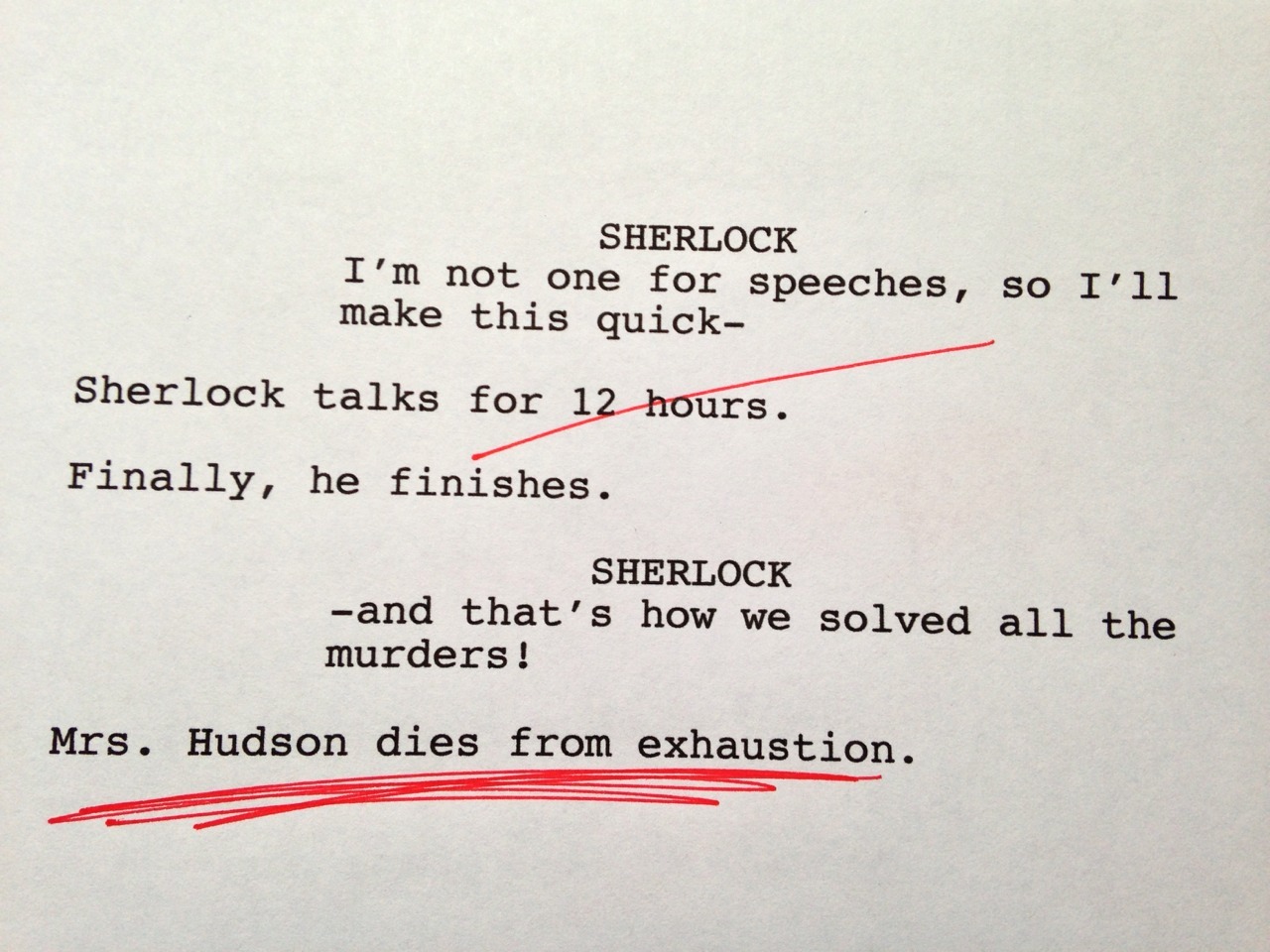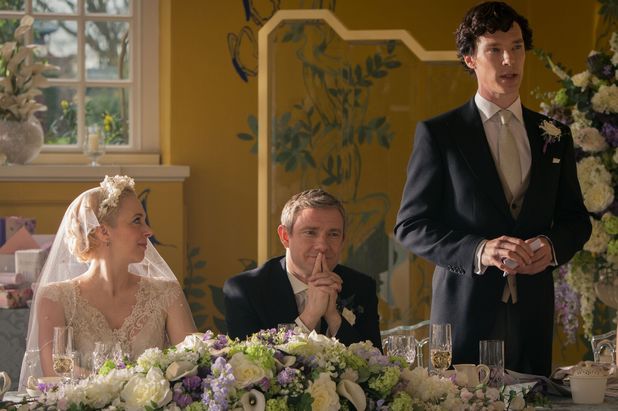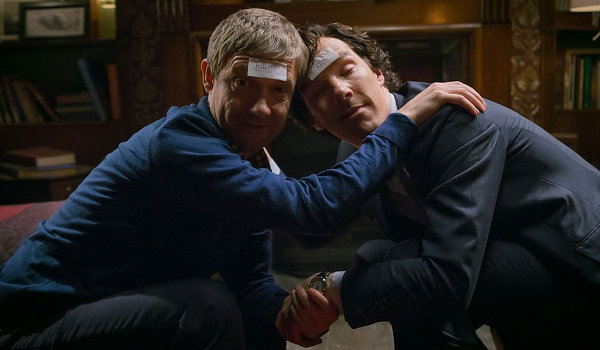Warning:
spoiler-filled rant ahead.
And…apparently
the game is not on. It’s tradition that the middle episode of each season of Sherlock will be the weakest, but The Sign of Three is possibly my least
favorite episode of all three season so far. The tragedy is, I know Steve Thompson – the writer
– can do better. While season one’s The
Blind Banker was corny, season two's finale The Reichenbach Fall was excellent.
But
let’s get down to it: the first thirty minutes are great. We’re thrown back
into the swing of things, as Sherlock starts to deal with the idea of life
without single John. “It changes people, marriage,” says Mrs. Hudson, widow of a double-murderer. The wedding itself starts
about twenty minutes in—naturally we completely skip any proceedings inside the
church and fast-forward to the reception. A group of amusing flashbacks show
Sherlock organizing the wedding, warning off Mary’s ex-boyfriend and having a
brief Iron-Man-3-esque personal Short Round. Sherlock has a conversation with
Mycroft which, once again, emphasizes how much the wedding is going to change
the Watson-Holmes relationship.
Then
comes the best man’s speech, which I expected to last about five, maybe ten,
minutes. My first mistake.
I
admit that it’s an original idea to compose an entire episode of flashbacks
contained in a speech, but it’s something that has to be dealt with
cleverly. In this case, the execution is far from clever, and at about the
forty minute mark I was longing for Sherlock’s speech to be over.
Unfortunately, we still had half an hour of Benedict Cumberbatch narrating a
succession of seemingly unrelated, disjointed, trying-too-hard-to-be-funny
cases. Sherlock in many ways runs on
dialogue, the chemistry between the leads, and this episode is a monologue.
The biggest problem is that it is assumed the whole wedding thing will be
more interesting than the normal state of affairs, i.e. chasing villains,
investigating international scandals, stealing ashtrays from Buckingham Palace.
And that assumption is completely wrong. Just because it is interesting to
imagine Sherlock Holmes being John Watson’s best man, it doesn’t follow that
tracking him in real time through the preparations, stag night, and onto the
dance floor will also be amusing. In fact, it comes very close to compromising
the character’s integrity, removing him so far from the dignity and careful
isolation of the Victorian Holmes that it’s difficult to tell him from Jonny
Lee Miller’s insipid modern boy-prodigy.
Of
course, it’s funny to put Sherlock in modern situations and ordinary places,
but only if it’s abundantly clear that they are not his element. It may seem
strange, but I think the thing that annoys me the most was when the audience
laughs at Sherlock’s speech, or awws when he says something sweet, like the invasive canned laugh on old sitcoms. Sherlock is a show-off, yes, but the
whole point is that he has an audience of one: John—not a whole army of boring
modern people. Then he plays the violin for the final dance—on a stage.
Sherlock isn’t a public person—he never has been. It just doesn’t feel
authentic.
The
prelude to the speech, in which he insults the audience, John, and the world in
general, then does an abrupt about-turn into earnest humility, is appropriate,
exquisitely written, and genuinely moving, but is quickly cheapened by the fact
he repeats a weaker variation several times. YES. We know how much you love
John. John is a life-saver. Nobody can live without him. Except for two and a
half years overseas without a second thought, apparently.
That
sort of repetition is a problem—Sherlock has marriage-won’t-change-things talks
with Mrs. Hudson, Mycroft, and John, while John has another with Mrs. Hudson. The
drunken stag night drags on into obvious slapstick and a painful client
interview—though the lab beakers full of beer were funny (FYI: for a primer on
how to do a Holmes/Watson stag night, see Sherlock
Holmes: Game of Shadows). There are a number of scenes that seem to exist
for no other reason but padding—when Lestrade and Molly talk in St. Bart’s,
when Sherlock and Molly talk in St. Bart’s, the random “inexplicable” case.
Sherlock’s mind-palace sequence meanders through an elimination process and fritters
away time asking women about their make-up. He asks for suggestions on a murder
case from the crowd, and I was wondering for a while if we were going to have everyone’s opinion.
By
the time we finally get around to unveiling the fact that there had, among the
jumble of Sherlock’s rambling, been a murder, I was so sick of the gigantic
yellow reception room that the revelation—a predictable one—brought no emotion
but relief. Finally, the loosely connected flashbacks are drawn together into a
slightly plausible, and quite clever, conclusion, but lacking in drama. It's too bad that the book was only barely referenced, because the series is at its best when playing with Conan Doyle's original.
Overall,
I wish I could be more positive. I seem to be one of the only people who
disliked the episode, but it’s hard to tell among the rabid fandom. But the whole idea struck me as contrived - Sherlock just happens to list the stories that have to do with a man who is coming to the wedding? He's not aware that he's assembling the evidence? I don't buy it.
But...there were things I liked:
But...there were things I liked:
 |
| Source |
1.
“I
am dismissive of the virtuous, unaware of the beautiful, and uncomprehending in
the face of the happy….John, I am a ridiculous man—redeemed only by the warmth
and constancy of your friendship.” That was just beautiful, a wonderful example
of Sherlock’s new conscience—he has begun to see the truth about his character,
the first requirement on the road to redemption.
2.
“Of
course you’re my best friend.” Freeman at his best. This was a lovely,
heartfelt, funny scene.
3.
“I’m
going to run him.” I just love how Mary is messing with both Sherlock and John and
they have no idea.
4.
The
opening scene was quite funny, though I wish they’d followed it up. I felt for
Gavin—I mean Greg.
5.
I
noted the foreshadowing of Sherlock’s “last vow.” At the moment, I’m trying to
drum up some optimism for next week.
My review of next week's episode: His Last Vow
My review of next week's episode: His Last Vow
2/5 stars
Hannah Long





No comments:
Post a Comment
Warning: blogger sometimes eats comments - make sure you copy your message before you post.